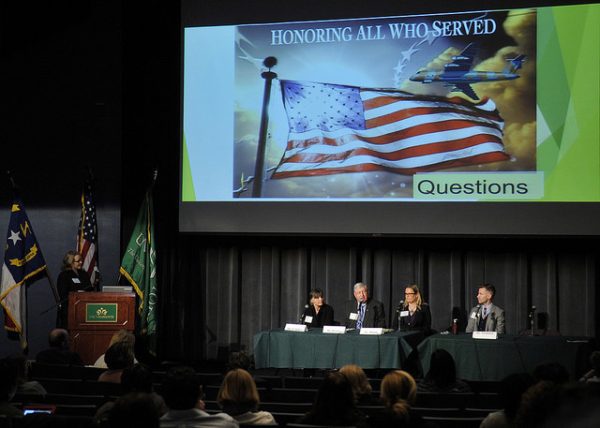Veterans’ Health Conference Pushes Community Dialogue

Some pausing at the door to knock the remnants of an unexpected snow flurry from their coats, dozens filed into the Cone Center Tuesday morning for a conference on veterans’ health.
Hosted by CHHS and headlined by Director of North Carolina Veterans Affairs Ilario Pantano and retired Major General Marianne Mathewson-Chapman, the meeting focused on how a better understanding of veteran culture and a holistic approach to healthcare can improve both its quality and accessibility for veterans.
Veterans’ health is an issue that resonates deeply in North Carolina; the state is home to more than 800,000 veterans, and the third-largest military force in the country. Despite this, Pantano said North Carolina hasn’t always been veteran friendly.
Pantano’s administration has responded to historical shortcomings by developing a strategy it says will turn North Carolina into the nation’s most veteran friendly state. He outlined the plan in a presentation to an audience that included veterans, healthcare professionals, academics, and concerned citizens. Pantano said NCDVA’s four-prong strategy focuses on 1) upgrading the efficiency of its own operations; 2) improving cooperation between agencies; 3) better communicating with veterans across the state and; 4) pushing a renewed legislative agenda.
Pantano is a former Marine sniper and platoon commander who served during the Persian Gulf War and in Iraq following the 2003 U.S. invasion. Under his leadership, NCDVA has taken steps to pursue its strategic agenda. The agency is active in the governor’s working group on North Carolina veterans. It has also launched a jobs initiative and a campaign intended to improve communications with the state’s veterans.
Major General Mathewson-Chapman, former Deputy Surgeon General for the National Guard, spoke Tuesday about the importance of a “holistic service delivery model.” Mathewson-Chapman argued veterans’ wellness should be broadly defined to encompass needs met by both health and social services. Housing, financial, legal, employment, and family needs must all be addressed in a comprehensive veteran’s healthcare network, she said.
A tension between competing realities may be behind some of the flaws in current programs. The system must respond to a vast array of experiences and needs while simultaneously providing a comprehensible experience to individual veterans. The former concern has prompted the creation of a bewildering web of agencies and organizations tasked with providing specific services, while the latter seems to demand just the opposite—as veterans often express frustration with program overlap and bureaucratic inefficiency.
Tuesday’s conference, like much of the nationwide effort to improve veterans’ services, focused on reconciling those issues.
Christine Elnitski is Chair of UNC Charlotte’s Academy for Veteran and Military Health and a conference organizer. Dr. Elnitski said veterans’ healthcare reform will require an effort coordinated across many professional disciplines and levels of government.
“The diverse needs of service members, veterans, and their families will require federal, state and local community service collaboration and coordination so these individuals may successfully transition back into roles as students, employees and family and community members,” she said. “Facilitating interaction between service members, veterans, families, community members and the academic community is vitally important to our understanding and coordination of holistic services for this diverse population.”
The conference, which included an audience Q & A with a panel of local health and social services providers, also addressed the need to supply culturally competent assistance. Panelists included Mecklenburg County Veterans Services Director James Prosser and Caregiver Support Coordinator Debra Volkmer.
Dr. Elnitski noted that UNC Charlotte is a natural environment for an energetic conversation on veterans’ healthcare to be taking place.
“Universities have a long tradition of fostering dialogue and providing education regarding diverse populations and their health and healthcare issues, she said. “Universities are the discoverers in health research, development of evidence-based treatments and innovative delivery system designs to support diverse population health.”
Dean Nancy Fey-Yensan captured this spirit, and the prevailing attitude of the morning in her opening remarks to the conference, noting “It is our time, our turn, and our privilege to serve those that have served us.”